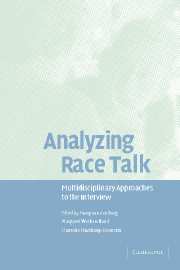Book contents
- Frontmatter
- Contents
- List of contributors
- Preface
- Acknowledgments
- Transcriptions symbols
- Introduction
- 1 Racism and the analysis of cultural resources in interviews
- 2 Analyzing racial discourse: the discursive psychology of mind–world relationships
- 3 Constructivist processes in discourse: a cognitive linguistics perspective
- 4 Institutional, professional, and lifeworld frames in interview talk
- 5 The uses of absurdity
- 6 Multiple voices in talking race: Pakeha reported speech in the discursive construction of the racial other
- 7 Contradictions in interview discourse
- 8 Racism, happiness, and ideology
- 9 The frame analysis of research interviews: social categorization and footing in interview discourse
- 10 Affiliation and detachment in interviewer answer receipts
- 11 Interviewer laughter as an unspecified request for clarification
- 12 Perspectives and frameworks in interviewers' queries
- Appendix: Interview transcripts
- Index
5 - The uses of absurdity
Published online by Cambridge University Press: 22 September 2009
- Frontmatter
- Contents
- List of contributors
- Preface
- Acknowledgments
- Transcriptions symbols
- Introduction
- 1 Racism and the analysis of cultural resources in interviews
- 2 Analyzing racial discourse: the discursive psychology of mind–world relationships
- 3 Constructivist processes in discourse: a cognitive linguistics perspective
- 4 Institutional, professional, and lifeworld frames in interview talk
- 5 The uses of absurdity
- 6 Multiple voices in talking race: Pakeha reported speech in the discursive construction of the racial other
- 7 Contradictions in interview discourse
- 8 Racism, happiness, and ideology
- 9 The frame analysis of research interviews: social categorization and footing in interview discourse
- 10 Affiliation and detachment in interviewer answer receipts
- 11 Interviewer laughter as an unspecified request for clarification
- 12 Perspectives and frameworks in interviewers' queries
- Appendix: Interview transcripts
- Index
Summary
This chapter is about how interviewees go about using absurdity in their expressions of their own views and their descriptions of others'. Expressing one's own views absurdly gets them registered, yet protected against the potential accusation that one “really meant it.” It is a way of doing what the discursive psychologists Edwards and Potter call “attending to stake and interest” (Edwards and Potter 1992). Absurdity can also feature in descriptions of others' views. That is a riskier proposition, but it can be done if you cloak it in a certain kind of concessionary form (the “show concession,)” Antaki and Wetherell 1999). If you do, the absurdity damages the opposition's case while seeming fairmindedly to yield something to it.
Views and attitudes
Why approach these data with an interest in looking into speakers' expressed views at all, let alone “absurd” ones, and why look into them, as I shall be doing, by close examination of exactly how those views are delivered in talk?
The first question is easy. For one thing, it is hard to read the interviews, or listen to them, and not get a feeling that at least one thing the speakers are doing, at least sometimes, is expressing what we would say in shorthand are “deeply held” or “powerful” opinions; just the sort of thing that Michael Billig's pioneering work on arguing (1989, 1991) encouraged us to linger over as “strong views.”
Information
- Type
- Chapter
- Information
- Analyzing Race TalkMultidisciplinary Perspectives on the Research Interview, pp. 85 - 102Publisher: Cambridge University PressPrint publication year: 2004
Accessibility standard: Unknown
Why this information is here
This section outlines the accessibility features of this content - including support for screen readers, full keyboard navigation and high-contrast display options. This may not be relevant for you.Accessibility Information
- 11
- Cited by
